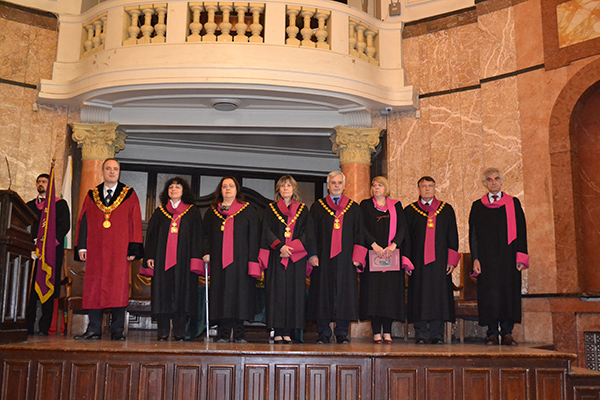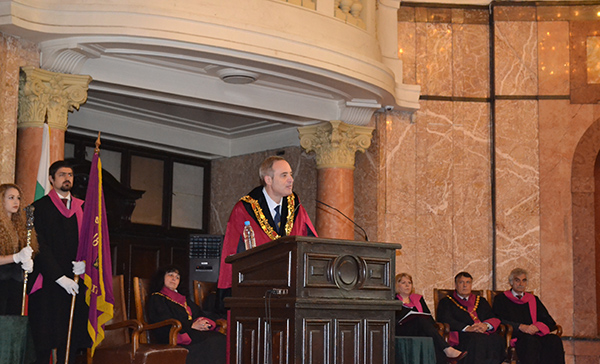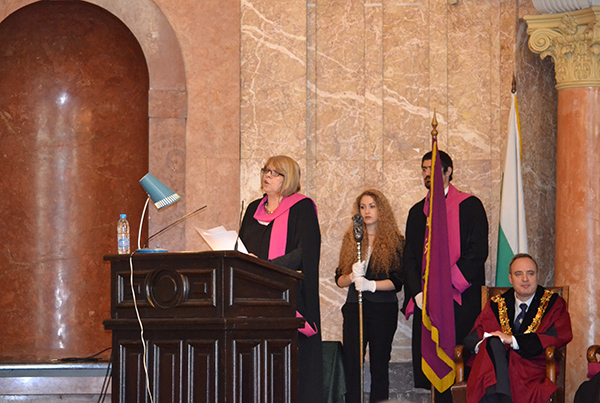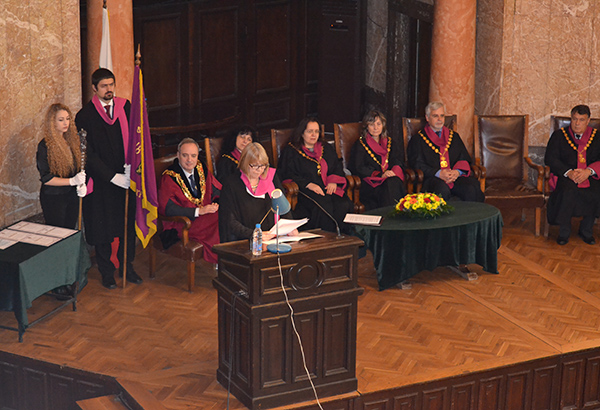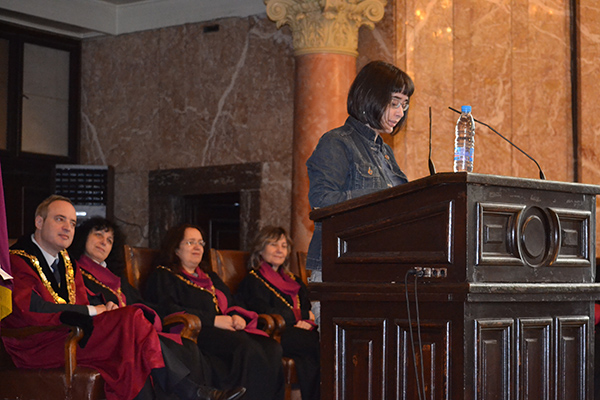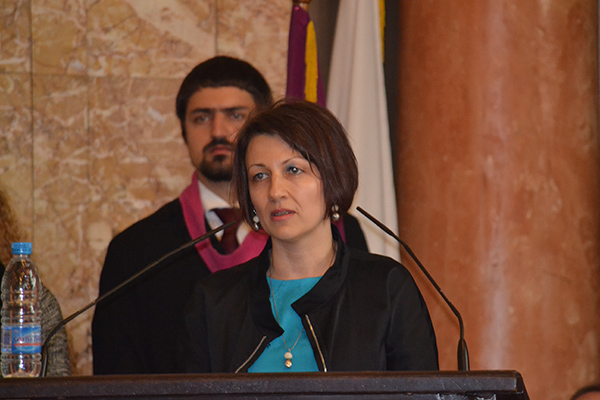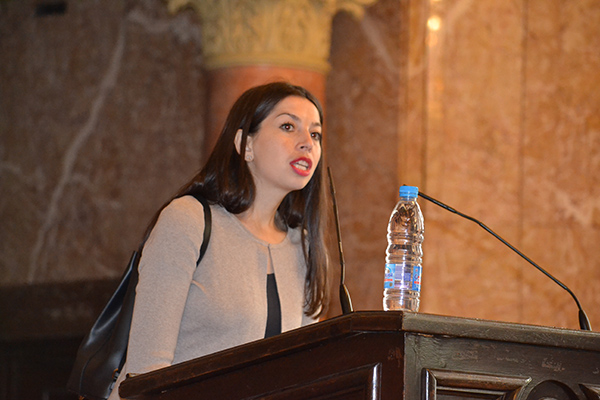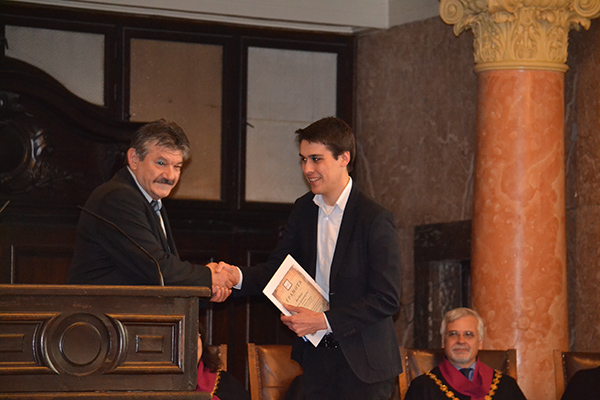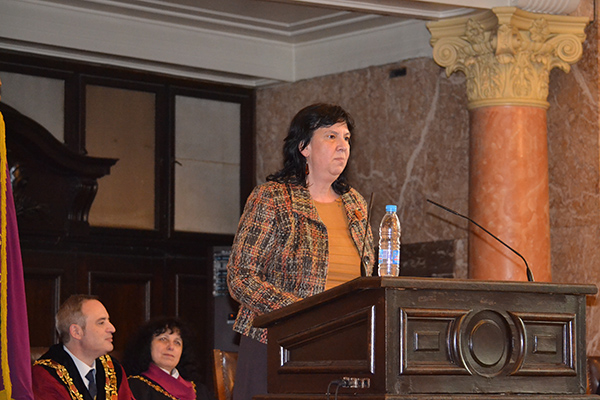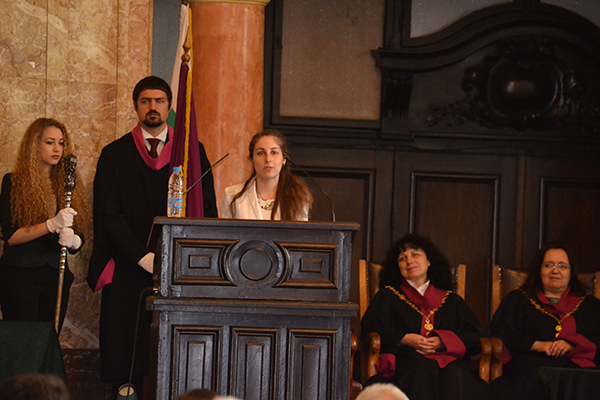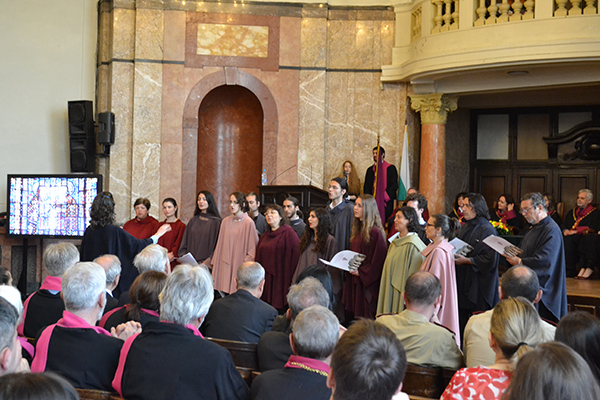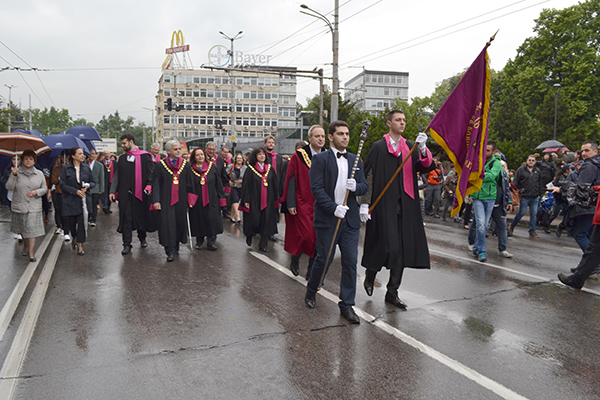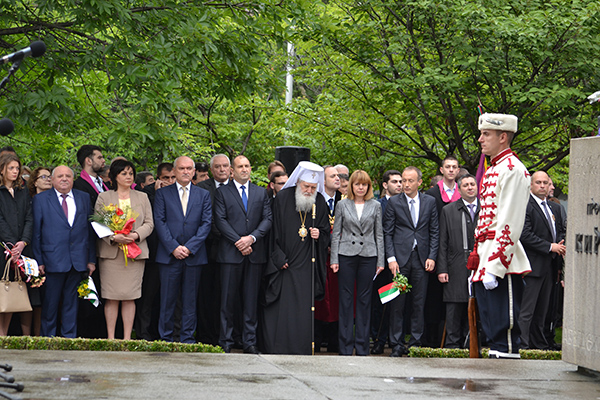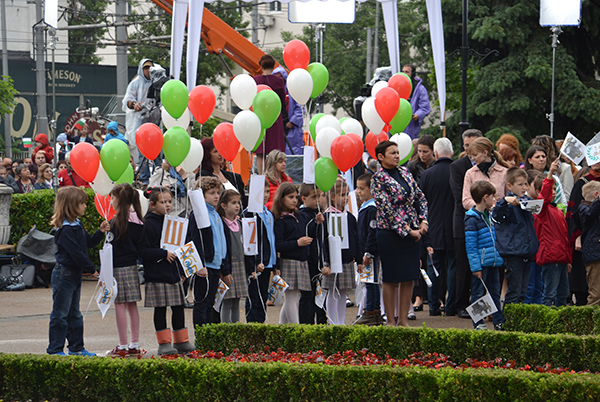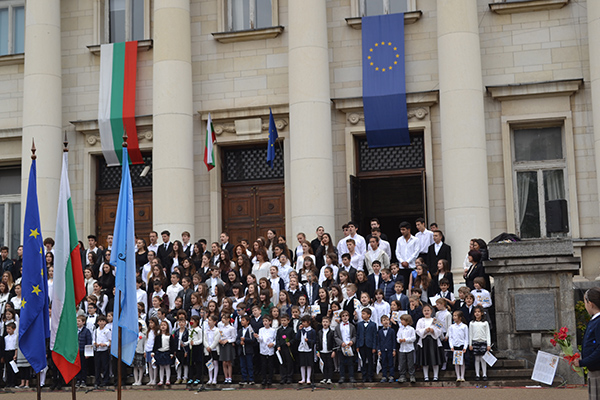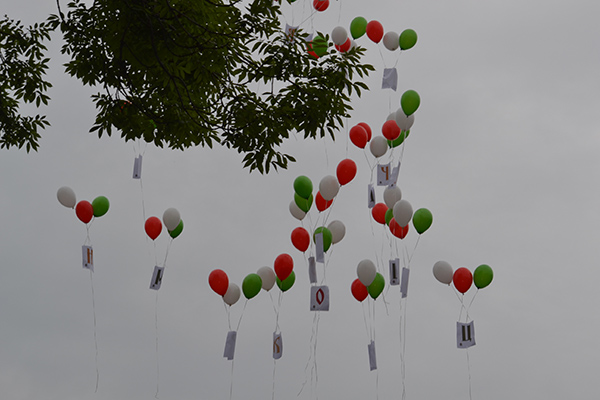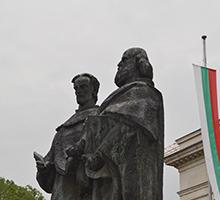
Professor Dr habil Anastas Gerdzhikov says: “The book will disappear us when our appreciation of letters leaves our hearts.“
The ceremony was attended by the Mr Dimiter Glavchev, Chairman of the National Assembly, Mr Yavor Notev, Deputy Chairman of the National Assembly, Mr Krasimir Vulchev, Minister of Education and Science, Professor Ivan Dimov, Deputy Minister of Education and Science, Ms Gabriela Kozareva, Deputy Minister for the Youth and Sport, Ms Nina Petkova, Member of Parliament, member of the Education and Science Commission at the National Assembly, Ms Irina Nikolova-Gurkova, Cultural Adviser of the President of the Republic, Professor Lyuben Totev, Chairman of the Council of Rectors, ambassadors, representatives of the scientific community, faculty, and students.
The academic celebration at Aula magna was opened by Professor Dr habil Anastas Gerdzhikov, Rector of Sofia University, who welcomed the guests and added that the 24th of May, the day of the alphabet, the spiritual might and culture of the Bulgarians, is the most Bulgarian feast, filling our hearts with pride and an occasion to commemorate the contribution of our people to European and world civilization. He remarked that it was our duty on that day to remember the feat of the two holy brothers, SS Cyril and Methodius, and also their disciples, St. Kliment Ohridski, the patron-saint of Sofia University being one of them, who were the source of our pride.
In the words of the Rector, for the amateur to invent the graphic signs of 30-40 letters was not a great feat, but in our case we were not talking of mere substitution of the Greek alphabet with new signs but rather of an analysis of the phonemic structure of the language that had to be put down to alphabetical writing. The process included the differentiation of each phoneme so that the equivalent new sign of it could be established.
In his speech Professor Gerdzhikov drew attention to the activities of the two brothers SS Cyril and Methodius following the invention of the alphabet – the translation into Slavonic of the necessary liturgical books, the expansion of the existing vocabulary to facilitate the translation of philosophical and theological concepts and the coining of abstract notions by drawing from the popular spoken vernacular.
Together with his translations, Cyril left a number of literary works too – polemic disputations, sermons, a brief history and some poetical pieces, Professor Gerdzhikov pointed out, and added that the two brothers created a new literary language: this is our Bulgarian language.
“The old Bulgarian writers (Chernorizets Hrabur, Yoan Exarch, Kliment Ohridski) refer to the language of Cyril as “Slavonic” and some authors were eager to specify that that meant ‘Bulgarian’”, the Rector mentioned. Professor Gerzhikov made it clear that new literary language the Bulgarians readily passed on to Serbs and Russians, and, at a later date, to the Church of Moldova and Wallachia in the Lower Danube principalities.
The Rector pointed out that ten years ago the Cyrillic alphabet became the third alphabet of the European Union and specified that the European dimension of the feat of St Constantine-Cyril the Philosopher had become even more prominent 25 years before when the first Roman Pontiff of Slavic descent, Pope John Paul II, proclaimed SS Cyril and Methodius, the Apostles of the Slavs, co-protectors of the whole of Europe.
Professor Anastas Gerdzhikov stressed that the celebration of that most Bulgarian holiday dated back to the times of the National Revival. In his words, it was high time we had a new revival of Bulgarian education, science and culture, and they should become part and parcel of a long-term national priority strategic program.
“Our alphabet, and spiritual and culture have taken us to such heights that they made it possible for Academician Lihachev to refer to Bulgaria as “the State of the Spirit”. It was up to us to remain worthy of such a recognition; otherwise we were bound to waste thoughtlessly the huge work done by apostles, saints and enlighteners. Are we going to turn into complacent consumers, cherishing only the immediately relevant and applied, or are we going to preserve the quest for knowledge and the spiritual enthusiasm generating science and education?” Professor Gerdzhikov asked rhetorically.
He expressed his conviction that the book, the best witness of man’s thirst for knowledge and spirituality, would never be replaced by tablets and smart phones. It had survived a remarkable evolution and had existed both as parchment and codex, to reach the form of a book in its modern outlook, but also to be preserved as papyrus, manuscript and printed paper. The book faces boldly changes of its material or form and will not disappear due to the technological progress, Professor Gerdzhikov noted and continued: “However, the book can disappear when we stop treasuring what it contains and stands for. It will not disappear when it changes its form but rather when we stop reading. The book will leave us if the value of writing abandons our hearts”.
The Rector appealed to his young colleagues to remember their kin and tongue, not to forget their childhood curiosity to explore the world, because if there was anything more sacred than knowledge, then it was the immersion into the meaning and secrets of the universe and truth.
Professor Anastas Gerdzhikov thanked and congratulated on the feast all teachers disseminating knowledge and preserving our culture and historic memory at schools, reading clubs, libraries and museums, the faculty and research workers at universities and the scientific institutions, the school and university students, and to all those who had always been reading aficionados. “May I congratulate you on the Day of Bulgarian Education and Culture, the Day of the Slavonic Alphabet, of our knowledge and Spiritual Freedom!.“
During the celebration the Director of the University Library, Associate Professor Anna Angelova delivered an academic speech on the Life of the Book. In her speech she said that on the day when we celebrated the most Bulgarian feast and paid tribute to the heritage of our first teachers, it was important to talk of the books. And here we did not mean the books of our everyday lives but rather of those special editions that had survived through the ages and reached us and made us active participants of past events. They let us get in touch with prominent personalities and ideas, hallmarks in history and science.
In her words, such books, very often difficult to access and scrupulously preserved, are an integral part of the world cultural patrimonium. “At the foundations of the history of librarianship lies the love of books, and some of the most interesting copies collected by bibliophiles are the so-called “curios”, Associate Professor Angelova pointed out.
She specified that “the curio book” was a special kind of publication, standing on the boundary between a museum item and a book, combining the features of a work of art and a paper artifact. In the course of time the notion was expanded to cover books having a number of “curios” such as unusual form or the material it had been printed on. There is a third point of view according to which the “curios” are the books of important information and due to that are inaccessible to the ordinary reader.
Associate Professor Angelova remarked that the ХVІІІth century marked the beginning of the process of commercialization of the rare “curio”, the latter viewed as a piece of art or luxury. That led to a change of the manner of perception and appraisal of the book and two groups tend to be gradually delineated in the process – the group of specialized merchants (e.g. antiquarians) and the group of collectors. The first inventories and catalogues of specific, highly demanded titles appeared.
“The book is viewed ontologically as a copy with its own history such as the qualities of being “rare” and “valuable”, the latter two being viewed for its curio nature from two points of view: relative curio value and absolute curio value,” Associate Professor Amgelova said and added that in 1763 г. the eminent publisher and book trader G. F. Debeur, Jr. coined the complex notion of “rare and peculiar book”. The new notion views the book through the prism of its content and formal (typographical) characteristics. Debeur succeeds in neutralizing the counteraction between the appraisal of the erudite, who set the value of the edition according to its content and its real auction price, based on typographical criteria.
At the beginning of the ХІХth century the demand of the market set an objective criterion of the value of the rare book. Parallel to the emergence of the commercial value of the book, the latter was perceived less and less as an object. It was at that time that in the practices of librarians there appeared certain editions that were given the status of emblematic (signal) books. Those were the editions that mark the vistas for development and have special importance for the demarcation of a given scientific discipline or play a fundamental role in the historical and cultural development of society, Associate Professor Anna Angelova said.
With the establishment of the Society of the French Bibliophiles in 1820 the mandatory elements for the identification of the curio editions included the state of preservation, the actual state and the provenance of the book, and one new characteristic – the bibliophile hierarchization of the individual copies. In her words the parameters of evaluation transcended the boundaries of the edition and focused more on the specific copy.
“Presently we observe a growing library interest as an element in the formation of the value of the characteristics of the book. It further develops in a theoretical aspect the well established from a bibliophile position of the absolute and relative value of the curio with reference to the edition and the individual copy including the parameters of “time”, “place” and “user”, Associate Professor Angelova pointed out.
Since the beginning of the ХХth century the trends amongst the bibliophiles have been determined by the emergence of the “new bibliophilia”, whose founder was Fernand Vanderem. The latter links the curio nature on one hand with the bibliophile parameters, and, on the other, the bibliophilia with the dominant literary currents, and brought to the fore the process of collecting the first editions. Thus, for him the notion of collecting is too narrow and he put forwards the concept of the “cultural and bibliophile library,” Associate Professor Angelova said.
In her academic speech she also drew attention to the views of the pioneer Bulgarian library science and long term director of the University Library Academician Stoyan Argirov, who first introduced the generalizing concept of the ‘outstanding book’, the latter covering editions both in terms of their formal characteristics and their content.
Associate Professor Angelova pointed out that presently the oldest and most venerable cultural institutions, the libraries, that have been existing for millennia, are facing new challenges and have to take difficult decisions. In her opinion, the libraries would continue to undergo a process of change, accepting the challenges of the new technologies by offering a growing number of e-books, e-magazines and a wider access to various data bases and digital collections.
“I am fully convinced though that the library will keep its major mission of being a guardian. It is a guardian of the literary heritage because if we do not know our past, we cannot have a future,” Associate Professor Angelova concluded, and added that an ever growing number of people believe in the future of the conventional book.
Traditionally the event also includes the presentation of the prizes to the winners in the XIth National Literature Poem and Short Story Competition organized by the St. Kliment Ohridski Foundation for students who are Bulgarian nationals, studying both in this country and abroad. The competition was established on the initiative of Professor Boyan Biolchev and was funded by him. The names of the laureates were announced by Senior Assistant Professor Dr Nadezhda Stoyanova from the Faculty of Slavic Philology of Sofia University.
She mentioned that 108 students took part in the competition that year, some of whom submitted both a short story and a poem. According to her, during the selection the jury did their best to identify the level of literary competence, quality and level of written expression and original ideas.
The poetry prize went to Stamena Datseva for her poem After Death. She is a third year Law student at the Faculty of Law.
Yana Yakimova, an MA student at the Translation Editing Program at the Faculty of Slavic Philology, was given a prize for her story Encantado.
Associate Professor Penchev, Dean of the Faculty of Slavic Philology, announced the winner of the Faculty’s Prize for a research book in the domain of the theory of literature. That was Associate Professor Diana Atanasova for her book The Rhetoric of the Historical.
Associate Professor Atanassova said that the Prize brought joy and honor to her. She thanked the Faculty of Slavic Philology and added that she also viewed the Prize as a stimulus in the field she had been working in – the theory of literature and medieval studies. Associate Professor Atanasova dedicated her award to her teachers and stressed their role in her overall work.
Senior Assistant Professor Dr Sirma Danova was awarded the Prize of the Faculty of Slavic Philology and the Georgi Rakovsky Association for a research book by a young scholar in the field of the theory of literature. Dr Danova was awarded for the book The Physiognomy King. Autotextuality and Autorepresentation in Pencho Slaveikov’s Works.
The award was presented by Menko Menkov, a representative of the Georgi Rakovsky Association, who wished to all young Bulgarians to persevere in their creative writing endeavors because if there were people who still wrote, it meant that there were readers, too. Sirma Danova thanked for the prize and congratulated everyone on the event.
Traditionally, the Blaga Dimitrova Foundation presents its scholarship to a Slavic Philology student on that day. The Foundation’s Chairman Tihomir Yurukov mentioned that Blaga Dimitrova had been a graduate of the Faculty of Slavic Philology in 1945 and it was in her honor that the Foundation had set up a scholarship at that Faculty. It was the eleventh time the scholarship had been awarded and the laureate was Boris Iliev, a third year Slavic Philology student.
Boris Iliev thanked for the high honor and said that the year before, while preparing for an exam in Slavic Literature, he had started reading Adam Mickiewicz’s Pan Tadeusz and was impressed by the translation, the rich lexis and imagery. He had opened the front page and realized that the poem had been rendered into Bulgarian by Blaga Dimitrova. “I am telling you all that because if you are to be a philologist today, you must have intellectual courage for it, that is humble scholarly courage,” Boris Iliev said. “I am proud of being a student of so many courageous people who are in our midst today. Thank you all for the distinction and congratulations on today’s feast!” he added.
The third year journalism student Zhaneta Turlakova, specializing in Radio Studies at the Faculty of Journalism and Mass Communication, won the Bulgarian National Radio Prize given in memory of Professor Veselin Dimitrov. The Prize was presented by Ms Albena Milanova, Director of the International Cooperation Directorate of the Bulgarian National Radio. Ms Milanova said that she took pride in being a Sofia University alumna and that it was a special honour for her to award the Prize. She pointed out that Professor Veselin Dimitrov was a luminary in the history of Bulgarian radio journalism and also a teacher of several generations of Bulgarian radio journalists. Albena Milanova expressed her hope that Zhaneta Turlakova would follow the steps of Professor Veselin Dimitrov and stand up to the principles of objective and independent journalism.
Zhaneta Turlakova expressed her gratitude and said that the prize was the best appraisal of her work in Radio Studies for the past two years. She thanked her teachers and congratulated everyone on the event.
The celebration finished with a musical program performed by the University Choir for Medieval Music.
Traditionally, earlier during the day, the Academic Council at Sofia University took party in the official ceremony of marking the 24th of May, the Day of Bulgarian Education and Culture and of the Slavonic Alphabet held at the monument of the two brothers SS Cyril and Methodius in front of the National Library.



